-
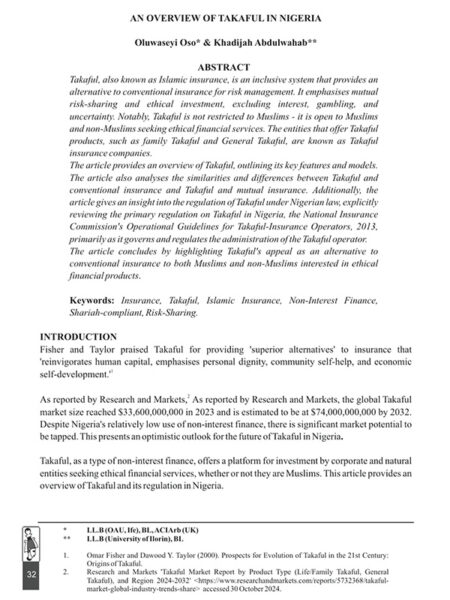
An Overview of Takaful in Nigeria
0₦2,500.00Oluwaseyi Oso and Khadijah Abdulwahab in their article, An Overview of Takaful in Nigeria, introduce our readers to the practice of Takaful, an Islamic insurance practice which provides an alternative to conventional insurance for risk management. Takaful underscores, among others, mutual risk-sharing and ethical investment which excludes prohibited elements such as interest, gambling, and uncertainty. Interestingly, Takaful, though must be Shariah-compliant is not restricted to Muslims – both Muslims and non-Muslims seeking ethical financial services can invest in Takaful products. The Takaful operators are Takaful insurance companies which offer Takaful products such as family Takaful and general Takaful. Oso and Abdulwahab provide an overview of Takaful, outlining its key features and models. Oso and Abdulwahab also analyse the similarities and differences between Takaful and conventional insurance, and Takaful and mutual insurance. Additionally, Oso and Abdulwahab give an insight into the regulation of Takaful under Nigerian law, specifically reviewing the primary regulation on Takaful in Nigeria, the National Insurance Commission’s Operational Guidelines for Takaful-Insurance Operators, 2013, especially as it governs and regulates the administration of the Takaful operator. They conclude by highlighting Takaful’s appeal, as an alternative to conventional insurance, to both Muslims and non-Muslims interested in ethical financial products.
-
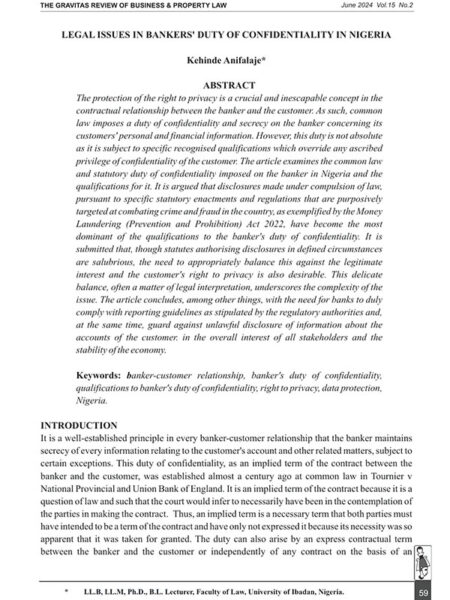
Legal Issues in Bankers’ Duty of Confidentiality in Nigeria
0₦2,500.00Dr. Kehinde Anifalaje, in his article, Legal Issues in Bankers’ Duty of Confidentiality in Nigeria, examines the common law and statutory duty of confidentiality imposed on the banker in Nigeria and the qualifications thereto. It is argued that disclosures made under compulsion of law, pursuant to specific statutory enactments and regulations that are purposively targeted at combating crime and fraud in the country, as exemplified by the Money Laundering (Prevention and Prohibition) Act 2022, have become the most dominant of the qualifications to the banker’s duty of confidentiality. Anifalaje submits that, though statutes authorising disclosures in defined circumstances are salubrious, the need to appropriately balance this against the legitimate interest and the right to privacy of the customer is also desirable. Anifalaje concludes, inter alia, with the need for banks to duly comply with reporting guidelines as stipulated by the regulatory authorities and at the same time guard against unlawful disclosure of information pertaining to the accounts of the customer in the overall interest of all stakeholders and the stability of the economy.
-
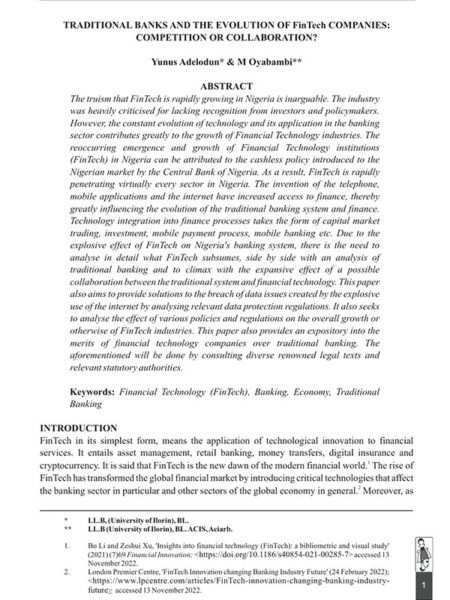
Traditional Banks and the Evolution of Fintech Companies: Competition or Collaboration?
0₦2,500.00Yunus Adelodun and M. Oyabambi in their article, Traditional Banks and the Evolution of Fintech Companies: Competition or Collaboration? examine the growing recognition of Fintechs, their technology and its application in the banking sector. They analyze in details what Fintech subsumes, side by side an analysis of traditional banking and climaxed with the expansive effect of a possible collaboration between the traditional system and financial technology. They provide solutions to the breach of data issues created by the explosive use of the internet, by providing an analysis of relevant data protection regulations. They also provide an expository into the merits of financial technology companies over traditional banking.
-
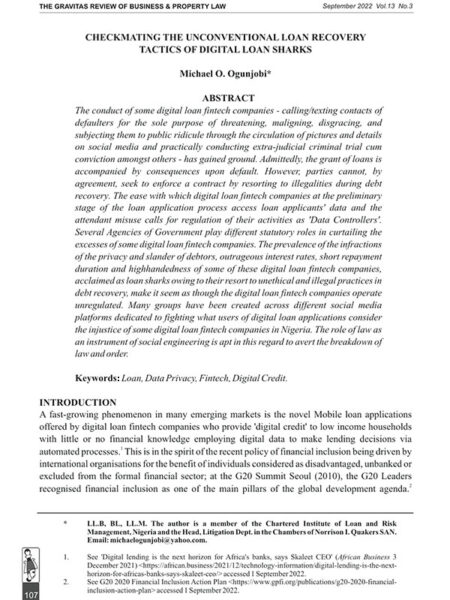
Checkmating the Unconventional Loan Recovery Tactics of Digital Loan Sharks
0₦2,500.00Michael Ogunjobi of the Chambers of Norrison I. Quakers SAN, and member of the Chartered Institute of Loan and Risk Management, Nigeria, in his article, Checkmating the Unconventional Loan Recovery Tactics of Digital Loan Sharks, notes that the conduct of some digital loan fintech companies – calling/texting contacts of defaulters for the sole purpose of threatening, accusing, disgracing, and subjecting them to public ridicule through the circulation of pictures and details on social media and practically conducting extra-judicial criminal trial cum conviction amongst others – has gained ground. Admittedly, the grant of loans is accompanied by consequences upon default. However, parties cannot, by agreement, seek to enforce a contract by resorting to illegalities during debt recovery. Ogunjobi examines the legal and regulatory framework of operation of digital loan fintech companies in Nigeria and steps that can be taken by both the authorities and consumers to checkmate their hideous loan recovery practices.
-
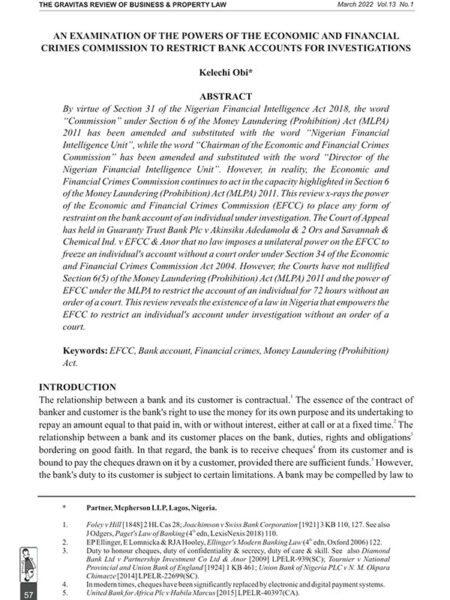
An Examination of the Powers of the Economic and Financial Crimes Commission to Restrict Bank Accounts for Investigations
0₦2,500.00Kelechi Obi, Partner, McPherson LLP, Lagos, Nigeria, in his article, An Examination of the Powers of the Economic and Financial Crimes Commission to Restrict Bank Accounts for Investigations, considers the provisions of the Nigerian Financial Intelligence Act 2018, the Money Laundering (Prohibition) Act 2011 (as amended), the Economic and Financial Crimes Commission Act 2004 in x-raying the powers of the EFCC to place restraint on the bank account of an individual under investigation. Kelechi reviews two crucial decisions of the Court of Appeal on the issue and concludes that there is a law that empowers the EFCC to restrict an individual’s account under investigation without an order of a court.
-
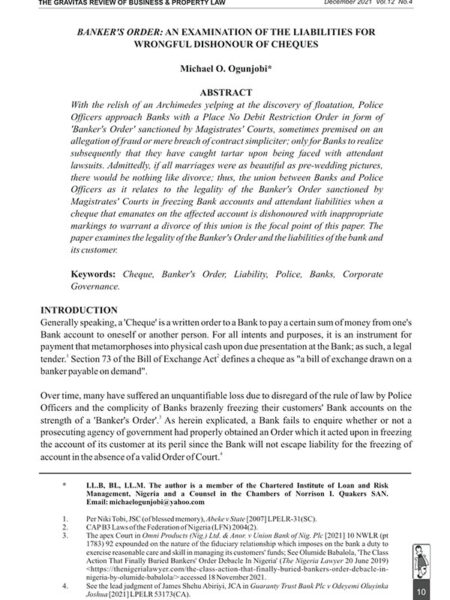
Banker’s Order: An Examination of the Liabilities for Wrongful Dishonour of Cheques
0₦2,500.00Michael Ogunjobi, of the Chambers of Norrison I. Quakers SAN, in his article, Banker’s Order: An Examination of the Liabilities for Wrongful Dishonour of Cheques, flays the practice by which Police Officers ‘freeze’ bank accounts acting on the so-called Banker’s Order’ issued by Magistrates. Ogunjobi examines the legality of the Banker’s Order, the bank’s customer’s liability for a dishonoured cheque and the reliefs the customer may pursue against the bank for a dishonoured cheque.
-
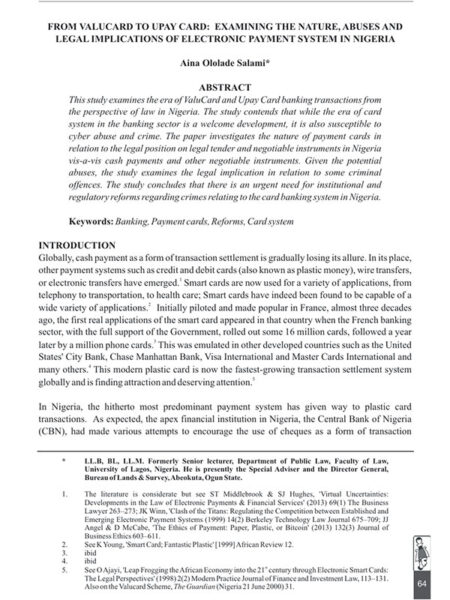
From Valucard to Upay Card: Examining the Nature, Abuses and Legal Implications of Payment Cards in Nigeria
0₦2,500.00Aina Salami, formerly Senior lecturer, Department of Public Law, University of Lagos and presently the Director-General, Bureau of Lands & Survey Ogun State, in his article, From Valucard to Upay Card: Examining the Nature, Abuses and Legal Implications of Payment Cards in Nigeria, examines the legal nature, types and abuses of payment cards in Nigeria. Given the potential abuses of card transactions, Salami explores some criminal offences relating to card transaction and advocates urgent institutional and regulatory reforms to accommodate global trends in payment systems.
-
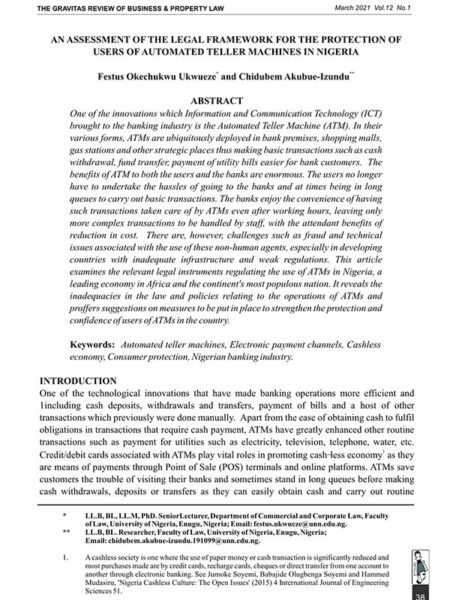
An Assessment of the Legal Framework for the Protection of Users of Automated Teller Machines in Nigeria
0₦2,500.00Dr Festus Ukwueze and Chidubem Akubue-Izundu of the Faculty of Law University of Nigeria Enugu Nigeria in their article, An Assessment of the Legal Framework for the Protection of Users of Automated Teller Machines in Nigeria, note the convenience and benefits of ATMs: faster cash withdrawals, easy fund transfer, convenient payment of utility bills. There are, however, challenges, mainly fraud and technical issues associated with the use of these non-human agents. Dr Ukwueze and Akubue-Izundu comprehensively review the relevant legal instruments regulating the use of ATMs in Nigeria. They posit that the laws and policies relating to ATMs’ operations are inadequate and proffer suggestions on measures to be put in place to strengthen the protection and confidence of users of ATMs in the country.
-
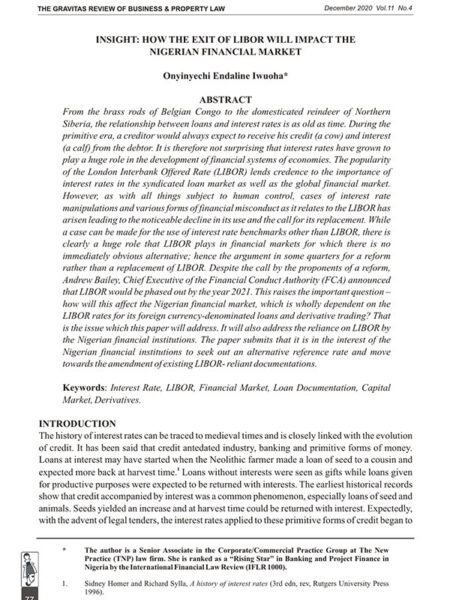
Insight: How the Exit of LIBOR Will Impact the Nigerian Financial Market
0₦2,500.00Onyinyechi Iwuoha, Senior Associate at the TNP Law Firm in her article, Insight: How the Exit of LIBOR Will Impact the Nigerian Financial Market, notes the popularity of the London Interbank Offered Rate (LIBOR) in financial markets worldwide. With the impending phasing out of LIBOR in 2021 by the (UK) Financial Conduct Authority due to what became known as the ‘LIBOR Scandal’, Onyinyenchi addresses how the exit of LIBOR would affect the Nigerian financial market which is wholly dependent on the LIBOR rates for its foreign currency-denominated loans and derivative trading; what alternative reference rates there are, and the amendment of existing LIBOR-reliant documentations.
-
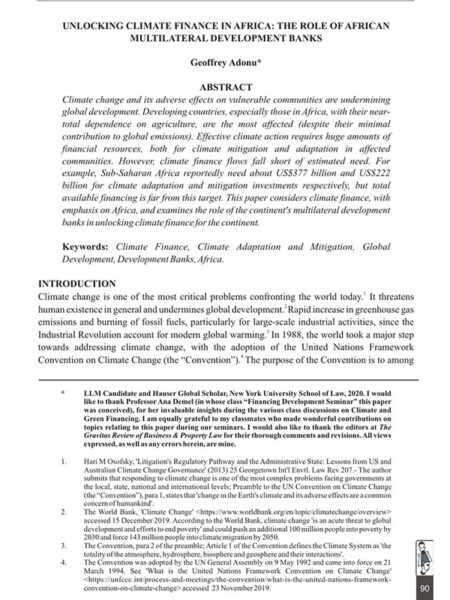
Unlocking Climate Finance in Africa: The Role of African Multilateral Development Banks
0₦2,500.00Geoffrey Adonu, Graduate Student at the New York University School of Law in, Unlocking Climate Finance in Africa: The Role of African Multilateral Development Banks, argues that climate change and its adverse effects on vulnerable communities are undermining global development. Developing countries, especially those in Africa, with their near-total dependence on agriculture, are the most affected despite their minimal contribution to global emissions. Effective climate action requires enormous amounts of financial resources, both for climate mitigation and adaptation in affected communities. However, climate finance flows fall short of the estimated need. Sub-Saharan Africa reportedly needs about US$377 billion and US$222 billion for climate adaptation and mitigation investments respectively, but total available financing is far from this target. Geoffrey considers climate finance, with emphasis on Africa, and examines the role of the continent’s multilateral development banks in unlocking climate finance for the continent.
-
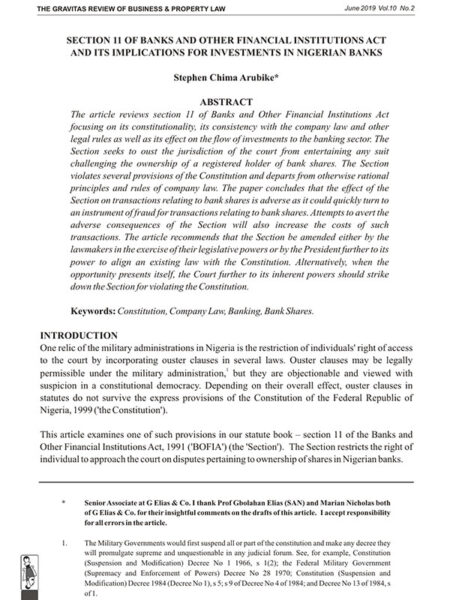
Section 11 of Banks and Other Financial Institutions Act and Its Implications for Investments in Nigerian Banks
0₦2,500.00Stephen Arubike, Senior Associate at G Elias & Co., Lagos Nigeria in his article, Section 11 of Banks and Other Financial Institutions Act and its implications for Investments in Nigerian Banks, examines the implication of section 11 BOFIA which ousts the jurisdiction of the courts in any suit challenging the ownership of a registered holder of bank shares. Stephen considers several decided cases and scholarly on the concludes that the section violates several provisions of the 1999 Constitution of Nigeria and departs from rational principles and rules of company law. He concludes that the section could have negative consequences on dealings and transactions in bank shares and ought to be struck down by the courts or amended by the parliament.
-
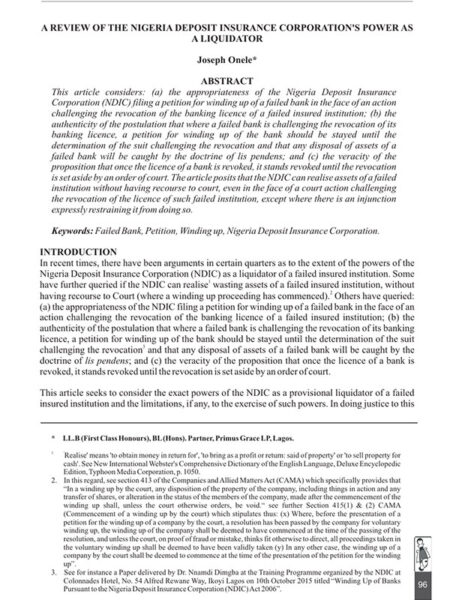
A Review of the Nigeria Deposit Insurance Corporation’s Power as a Liquidator
0₦2,500.00Joseph Onele Partner, Primus Grace LP, in his article, A Review of the Nigeria Deposit Insurance Corporation’s Power as a Liquidator considers the appropriateness of the Nigeria Deposit Insurance Corporation filing a petition for winding up of a failed bank in the face of an action challenging the revocation of the banking licence of a failed insured institution; the authenticity of the postulation that where a failed bank is challenging the revocation of its banking licence, a petition for winding up of the bank should be stayed until the determination of the suit challenging the revocation and the veracity of the proposition that once the licence of a bank is revoked, it stands revoked until the revocation is set aside by an order of court.
The Gravitas Review of Business & Property Law



